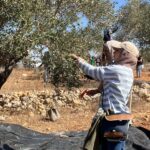It’s a gray and drizzly mid-morning on Sonnenallee, commonly known as Berlin’s “Arab Street.”
Since late last year, large-scale protests have erupted here in the German capital’s borough of Neukirchen, and an alleged police crackdown has been described as shocking and violent by pro-
Palestinian protesters.
Francesca Levin, 31, and Lee, 27, have regularly marched with thousands of people across Germany since October 7, when the latest escalation in the Israeli-Palestinian conflict began, to speak out for Palestinian rights and to call on Germany. Joining together to reconsider its unwavering support for Israel.
Lee, who arrived in Germany seeking asylum from Syria in 2015, said she was recently arrested at a protest. He told Arabic media to withhold his real name for fear that his employer might take action
against him.
In addition, he said, the homes of Palestinian supporters have been raided. “[Neukoelln] was always a political place for me, a place where many people whose residential status was unstable could live.
“It was a shock to me to witness this level of police violence. The authorities were not considering that this is the area where people are getting news of their families being killed in Gaza, this is where
They want to express their grief and anger.
He said the recent tensions had changed his “perception as a migrant”, as he alleged high levels of racial profiling during arrests at protests.
“Germany was one of the few countries that welcomed us after we fled the conflict zone but now, they are terrorizing and criminalizing me and many others,” he said.
Leon and Lee first met at the protests and quickly became close.
Levin, a German-born Palestinian, said the war has affected her life in ways she never imagined.
He said that my personal life has completely changed. “I was patient at first and waited for the support of people in my friendships and wider circles. But then it became clear that their solidarity was going
to have its limits.
He called the support of some left-wing Germans conditional.
“They were telling me that they wouldn’t go to a demo unless there were circumstances, like not walking with someone chanting ‘from the river to the sea’ or wearing a keffiyeh. Even That they know I’m
Palestinian and my family fled, it wasn’t enough to just say I stand with Palestine. So, I had to say goodbye to a lot of people.
Berlin’s police force has denied racial profiling of protesters, saying officers are trained to adopt a “dialogue-based approach”.
A spokesman told Al Jazeera that 112 pro-Palestinian events were held in the state of Berlin from October 7 to March 5.
The Federal Police, Germany’s main criminal investigation agency, said that as of March 11, there had been 1,349 “measures to restrict freedom” across the country related to the Israeli-Palestinian conflict, but did not determine whether the measures were pro- Palestinian. were or pro-Palestine-Israel events.
Freedom restrictions are short-term measures, such as briefly detaining protesters for questioning before releasing them.
Home to the largest Palestinian diaspora in Europe, with a reported 30,000 people, Germany has been one of Israel’s staunchest allies in recent months.
A young man working at the shop, decorated with Palestinian flags and keffiyehs, told Arab media that he had been told by his manager not to give interviews to the media because the German authorities
were closely monitoring the shop.
He said such outspoken support for Palestine meant authorities could suspect him of links to Hamas, which Germany, like the United States, Britain and the European Union, has designated as a terrorist
group.
Israel has said it wants to crush Hamas, which rules the Gaza Strip, after the group carried out an attack in southern Israel on October 7, killing at least 1,139 people. Since then, Israel’s campaign in Gaza has
killed more than 30,000 people, mostly women and children.















